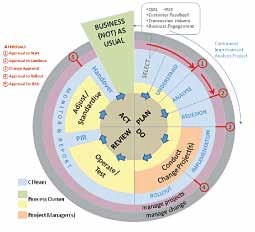PROJECT NAME | Continuous Process Improvement
Continuous process improvement across a large organisation requires not just management commitment, but also a robust and practical methodology supported by effective training and useful documentation. Recognising both the difficulty of the task and its critical importance for future organisational performance, Centrelink created the Continuous Improvement Team to develop, implement and continuously improve a standard methodology for discovery, analysis, redesign and improvement of selected business processes throughout Centrelink.
To guide and support the development of the business process continuous improve- ment environment, Centrelink engaged Leonardo Consulting to deliver a BPM education program, integrate the BPTrends Associates methodology into existing Centrelink systems and to oversee initial proof-of-concept projects.
The result has been a sophisticated and effective continuous improvement capability that will deliver significant benefits to Centrelink over many years.
Centrelink is a complex organisation within the Australian Government. It delivers services on behalf of 27 other agencies in both normal and emergency conditions. Across Australia 27,000 staff support 6.5 million customers. Centrelink‘s purpose is formally described as: Serving Australia by assisting people to become self-sufficient and supporting those in need.

This graph illustrates one of the challenges facing Centrelink. Australia’s aging popula- tion will significantly increase demand for Centrelink services. This “grey tsunami” must be managed within Centrelink resource constraints.
Change in the level of national employment is also a key driver for process-based management at Centrelink. The assessment, payment, management and review of programs supporting those seeking employment is a major component of Centrelink’s activities. Even small increases in the unemployment rate cause a considerable increase in work throughout the Centrelink network.
A third key driver is the pivotal role that Centrelink plays in times of national emergency such as floods and bushfires. It must respond quickly with people and services in difficult physical and emotional circumstances. If global climate change is to result in more extreme weather events, this will also increase the demands on Centrelink to provide a wide range of services in a timely and efficient manner.
In December 2008, the Centrelink CEO requested more consideration be given to continuous improvement of business processes.
A general framework for Business Process Management (BPM) Continuous Improvement (CI) was endorsed in January 2009, for imple- mentation under the stewardship of the National Quality Committee chaired by the Deputy CEO, Customer Service and Emergency Management. Leonardo Consulting played an important role in assisting Centrelink to operationalise these aspirations.
The Continuous Improvement Team (CIT) was established as a core business function, within the Business Process Design Branch, in February 2009 to establish and manage CI within Centrelink. It’s key role was to provide process improvement and process management consis- tent with Centrelink’s strategic priorities, purpose and core values.
The CIT was tasked to develop, implement and continuously improve a standard methodology for discovery, analysis, redesign and improvement of selected business processes throughout Centrelink. The CIT identified four key elements to achieving this goal:
To achieve these goals Centrelink chose to engage Leonardo Consulting to deliver an integrated package of BPM training, methodology integration and proof-of-concept projects.
A three phase approach was taken to the initial assignment with Centrelink:
Leonardo Consulting began this assignment with Centrelink by conducting a series of BPM training courses. These courses, the BPTrends Associates Professional Certificate curriculum, were:
Once the standard process improvement and management methodology had been studied and understood in the training courses it had to be integrated into existing Centrelink project methodologies and approval procedures.
This was done very effectively by the CIT and Leonardo Consulting, as shown in this diagram, providing Centrelink with a world class process improvement meth- odology embedded in its long standing Plan-Do-Review-Act approach and well established project governance systems.

With a sound methodological underpinning, two proof-of-concept projects were commissioned.
The first project was to do with benefit recipients advising Centrelink of changes in their circumstances, eg change of address. Depending on the nature of the change, such notification can trigger a series of subsequent processes of primary importance in the maintenance of payment integrity. Change of Circumstance notifications occur many millions of times a year and are therefore an important target for continuous process improvement.
The second project concerned a particular payment type that absorbed significant Centrelink resources and was therefore an excellent candidate for process simplification and improvement. As in all of it’s operations, Centrelink was also keen to minimise any unnecessary requirements placed on its customers in this payment stream.
As these and other projects are completed, the CIT will continuously review its own processes and make adjustments as required to improve project outcomes.
The CIT, with support from Leonardo Consulting, achieved, or took essential steps towards realising, some important benefits during this assignment:
Via this assignment Centrelink established a sound basis for its ongoing objective to create a culture where all staff are engaged in the continuous improvement of key business processes via a consistent methodology that is itself the subject of ongoing optimisation. These developments greatly assist Centrelink to deal with increasing demands on its resources including those related to an aging population, changes in employment levels and national emergencies.
Via this assignment Centrelink established a sound basis for its ongoing objective to create a culture where all staff are engaged in the continuous improvement of key business processes via a consistent methodology that is itself the subject of ongoing optimi
– Roger Tregear, Consulting Director Leonardo Consulting
Leonardo drives continuous process improvement through technology and has worked with many leading enterprises in APAC to enhance the performance of their business processes through architecture and automation as well as integrating their applications, platforms and data to enable disruptive technologies.
2022 ©Incotrade Australia Pty Ltd trading as Leonardo Consulting | All rights reserved | ACN 066 273 256. | Privacy Statement